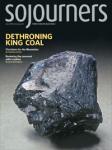I believe that radical obedience to Jesus Christ means to be identified with the poor. The gospel claims that God himself in his Son got into human life at the point of the weak, the despised, the rejected, the sick, the imprisoned, the least of the race—the last, not the first. He entered into human life with the powerless and the vulnerable who were buffeted to and fro by all the cruelties of physical and human nature. Jesus Christ gave himself to the weak, to the despised, to the forsaken; and because of this identification, Christ was himself despised and rejected. Our savior was a man of sorrows and acquainted with grief. The forsaken were his people. He didn’t simply dip into their life and problems momentarily and then slip out again. His father had sent him, and it was very clear that it was to the forsaken that he was sent.
While he was with them his posture was that of a servant. He refused to exercise power over them. When they wanted to make him their king, he went into the hills to pray. ... He loved the riffraff and the rabble so deeply that he simply wanted to be with them, and to serve them in whatever form their need might shape his service. What he got out of it was simply the doing of his father’s will, which to him was his meat and drink. What he got out of it was simply the joy of being with the victimized poor.
Gordon Cosby was pastor of Church of the Saviour in Washington, D.C., when this article appeared in the Post-American, the original Sojourners.

Got something to say about what you're reading? We value your feedback!